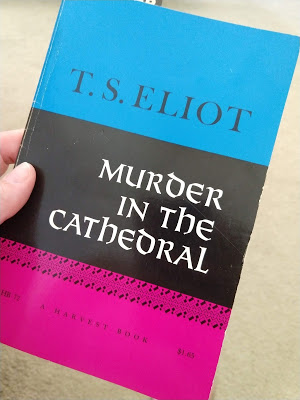Book Review: Murder in the Cathedral by T.S. Eliot
 |
| I like my cover better than the one GoodReads assigned |
 Murder in the Cathedral by T.S. Eliot
Murder in the Cathedral by T.S. Eliot
My rating: 5 of 5 stars
Own.
I’ve never read any Eliot before and reading this does not dissuade me from reading more. I loved this.
I didn’t get most or all of it, I’m sure, but the parts I did comprehend are good and true and beautiful.
All men seek peace. We seek peace wrongly, we seek wrong peace, we misunderstand the peace that is given in Christ. Eliot shows us glimpses of this as he looks at peace – temporal and eternal – through temptation and death. The hinge of Becket’s Christmas Day sermon shows us this.
The first half – with the chorus awaiting his return after seven long years – reminds us that life is both static and dynamic. The seasons change and go on and work continues in its repetition. But going back for repetition of situation is not possible. The chorus is waiting for Becket almost as we wait for Jesus to return; almost, but not quite. I think we’re supposed to consider that, though. Waiting is not the peace that is left for us.
The temptations are sent to destroy Becket’s peace, even as Jesus was tempted in the desert. If the test fails – particularly the last tests – both would fail in the work they’ve been given. Becket’s temptations – memory and nostalgia of a good life; secular power over the church; ecclesiastical power over the state; and the final, most spiritual battle with himself, when being humble is the highest virtue how does one avoid humility for gain?
You only offer
Dreams to damnation
and
Now is my way clear, now is the meaning plain:
Temptation shall not come in this kinda gain
The last temptation is the greatest treason:
To do the right deed for the wrong reason.
and
To become servant of God was never my wish.
Servant of God has chance of greater sin
And sorrow, than the man who serves a king.
For those who serve the greater cause may make the cause serve them,
Becket defeats the temptation, not in the same way as Christ who used scripture against his tempter, but through reason. And so he can preach,
A martyrdom is always the design of God, for His love of men, to warn them and to lead them, to bring them back to His ways. It is never the design of man: for the true martyr is he who has become the instrument of God, who has lost his will in the will of God, and who no longer desires anything for himself, not even the glory of being a martyr.
And then the knights arrive.
The second part goes quickly. It’s action and violence, accusation and pulling away. Becket stands open to what is in store for him, refusing even to bar the church closed. His priests are afraid for him – pulling, hurrying, pleading, attempting to protect. They’re rushing him from here to there to avoid the fate he’s expecting. If the chorus was waiting for his return, he is expecting the events. What is the difference here between waiting and expectation? And which gives us peace? Which fear?
Thomas: Peace! be quiet! remember where you are, and what is happening;
No life here is sought for but mine,
And I am not in danger: only near to death.
Emphasis mine.
Becket is at peace because he is expecting the events to unfold as they do. He knows that the church stands not as the world does and that Christ’s peace is not as the world gives. He demands the doors unbarred. He demands,
You think me reckless, desperate and mad.
You argue by results, as this world does,
To settle if an act be good or bad.
You defer to the fact. For every life and every act
Consequence of good and evil can be shown.
He knows that
Not to fight with beasts as men. We have fought the beast
And have conquered. We have only to conquer
Now, by suffering. This is the easier victory.
Now is the triumph of the Cross, now
Open the door! I command it. OPEN THE DOOR!
The knights kill him. The chorus grieves.
Then they return to their work, because time marches on and there’s nothing they can do.
The knights return to try to excuse their complicity – with arguments of honour; loyalty and duty (“only following orders”); reason and law; and, finally, victim blaming. They leave with warnings of possible riots and the dire consequences thereof. They have not brought peace.
The priests return. They don’t really understand, either. One waits for the potential consequence of atheism in the country. Another is not so fearful, but is certainly cynical about martyrdom and its cost. They have no peace.
Eliot weaves many themes – waiting and expectation, peace and fear, and the march of time together to create a whole. Eliot’s time moves ever forward. It is inexorable. How will we use it? Will we, like the chorus wait, endlessly striving at vain work in fear? Or will we work in peace with expectation toward the Kingdom coming? What will tempt us away from patient expectation? Who will attack? Are we seeking peace, peace where there is no peace? or are we receiving from the Prince of Peace the peace that only He can give?
